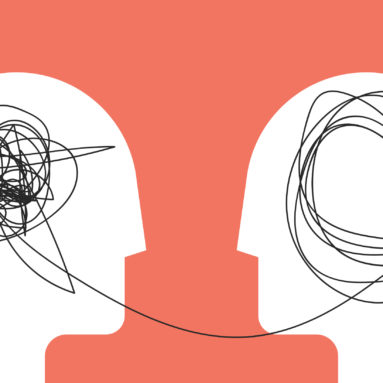
Share article:
Tags:
Written by Matt Giblin
Trigger Warning: Suicide.
The 10th October marks World Mental Health Day, and admirably so we have seen many news headlines, social media trends and eye-opening stories offering the opportunity to raise awareness, dispel the myths, and offer practical tips. All in support of the 1 in 4 of us who will suffer with our mental health, each year.
I will openly admit that there have been times where I have suffered with my own mental health in my adult years. Fortunately thanks to some very supportive family, friends, colleagues and healthcare professionals, it’s a battle that I am now winning (although it certainly hasn’t been an easy one). It’s very clear that this isn’t the case for us all, and the difficulties that the past 18 months in particular have presented, have surprised, overwhelmed and debilitated many.
My psychology degree taught me that mental health and conflict are very often linked. Many of our daily struggles are based on an internal conflict between competing desires, beliefs or personal values.
What kind of conflicts might we experience when struggling with our mental health?
Whether suffering with a diagnosed disorder or facing mental health difficulties based on the stresses of our day-to-day lives, internal conflicts are a common dilemma. A few examples spring to mind…
…The conflict for a person with a substance use disorder between wanting to stay sober, yet wishing to escape from the internal pain they are experiencing.
…The conflict for a person experiencing suicidal thoughts between their desire to speak/ seek help about how they feel, but not wanting those close to them to worry.
…The conflict for a person with a diagnosed condition to want to tell their employer, yet not wishing to face judgement or fear their job being at risk.
…The conflict for a bipolar sufferer between wanting to take their medication to keep stable and function well; yet craving the euphoric feelings and excitement that a manic episode could bring.
…The conflict for a person experiencing social anxiety between wanting to go out, meet people and have an enjoyable time, but also wanting to avoid the crippling fear that such interactions could generate.
The Impact of Workplace Conflict
With enough internal conflict already happening, the last thing we need is a fear of facing further conflict with others, in our workplaces, family or social lives. According to HR Magazine, 84% of employees felt that their overall health had been impacted by workplace conflict. The consequences of poor mental wellbeing in the workplace may include:
- Reduced performance & productivity
- Poor decision making
- Increased rates of errors and accidents
- Avoiding social contact with colleagues such as meetings
- Increased absence rates
- Staff turnover
- More grievances
- Damaged morale
Unfortunately, conflict in the workplace can’t always be avoided. The experience may be worsened by some of the typical symptoms of poor mental health:
…A depressed mind may heighten the negative emotions, and fear associated with interacting with a person we are in conflict with.
…Paranoia could cause us to think others are talking about us behind our backs, or have negative intentions towards us, when they do not.
…Anxiety may cripple us from feeling able to travel into the office and be in the same room as someone who has made a complaint against us.
Can our mental health make us more prone to conflict?
My short answer would be absolutely, yes it can.
When I look back to the times where I have struggled with my own health, I would be more likely to take offence to something that wouldn’t usually bother me; read the intentions of others as negative, or perhaps just generally be a bit more difficult to get along with.
I want to avoid making sweeping generalisations here, but I think it’s safe to say that, when emotions are running high, conflict can be more likely to develop.
What can we do to support our colleagues?
Acceptance and recognition are key.
Accept that your colleague is struggling with their health. They aren’t weak. In reality, if they are showing up to work and putting the effort in, whilst unwell, they are in fact showing an incredible strength.
Accept that they might need time away. You wouldn’t question someone taking a day off for food poisoning, chronic back pain, or while recovering from an operation. Mental illness happens when our brains are unwell. The brain is a physical organ. Mental Health is Physical Health.
Recognise your colleague for the smaller achievements when they aren’t well. Poor mental health makes everything more difficult.
Recognise that a colleague with a long-term mental health condition has a disability. You wouldn’t think twice to put an access ramp in for a colleague using a wheelchair- think about the reasonable adjustments you could make to minimise the impacts of their condition.
Traditional HR Policies aren’t helping
Traditional responses to complaints, concerns and conflicts at work involve lengthy processes and stressful investigations, exacerbating the issues and driving employees further away from each other. It doesn’t require a psychologist to recognise the potential impact these can have on our mental wellbeing.
By their nature, such processes generate a blaming mechanism. An investigation doesn’t seek to resolve the underlying problem, it takes the parties backwards, forcing them to re-live the stressful conflict, and put their effort into ensuring that the other person(s) lose out more than they do.
We hear all too often of the lengthy sickness absences associated with those involved with formal procedures. The tragic Nurse Abdullah suicide was a cruel example of the potentially devastating consequences that can result when processes are delayed, or poorly conducted.
Can Mediation be the Solution?
Mediation offers a (generally) far less stressful alternative. Rather than dragging on for weeks and months at a time, the process can be completed in one day. There are many benefits for the parties involved, whether they are struggling with their mental health, or not:
- The presence of a friendly, empathetic and impartial mediator can relieve the anxiety around directly talking to a person we are in conflict with.
- As the process happens quickly, it can prevent the issues from building up, and impacting our mental wellbeing.
- A mediator with specialist knowledge in mental health can support the parties in building a better understanding of the various symptoms and their impacts.
- By opening up and sharing what we really feel, it can become clear that some of those perceived negative intentions of our colleague, were in fact well-meaning.
- The process builds resilience. Making us less prone to future conflicts, and in doing so protecting our mental wellbeing.
Of course, there are times where the involvement of an impartial 3rd party is needed. However, if we are all able to have these open and honest conversations around mental wellbeing, full of acceptance and recognition, then not only can conflicts be prevented, but the health of our staff can be protected.














